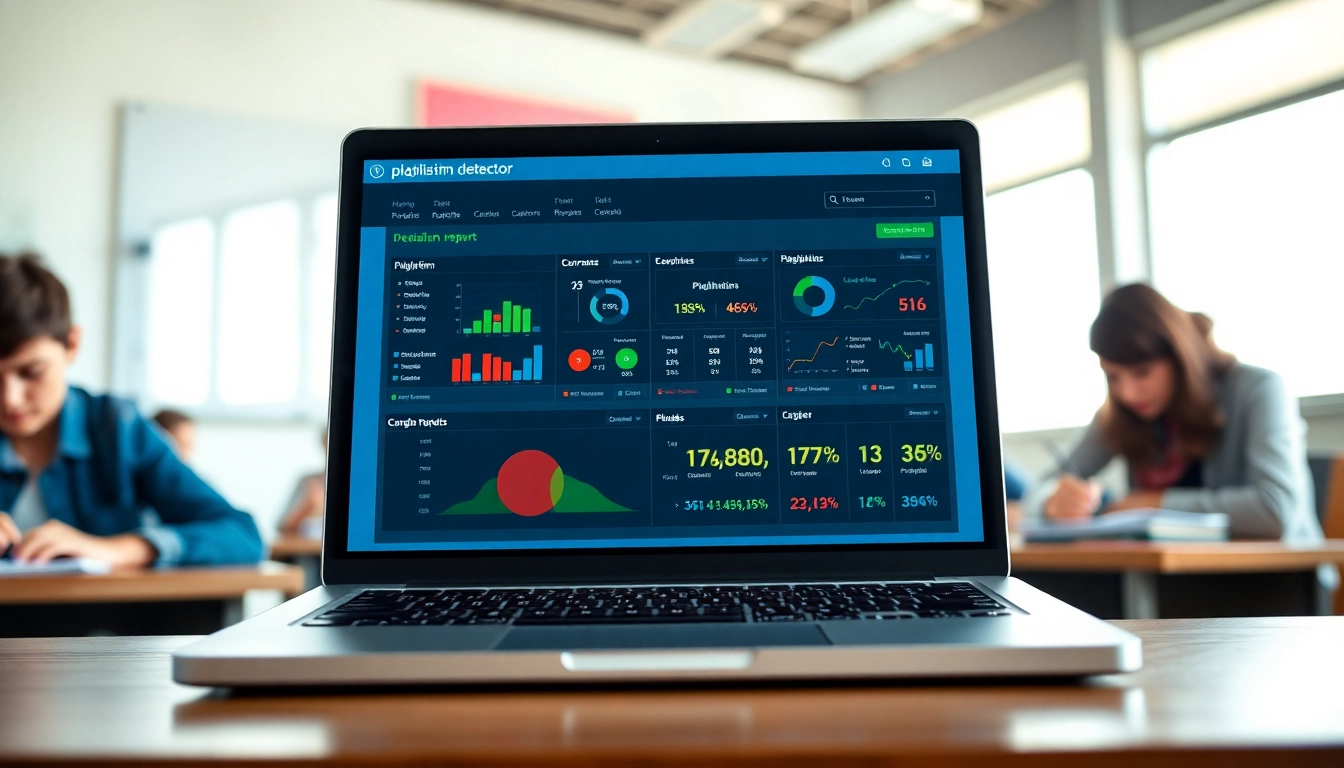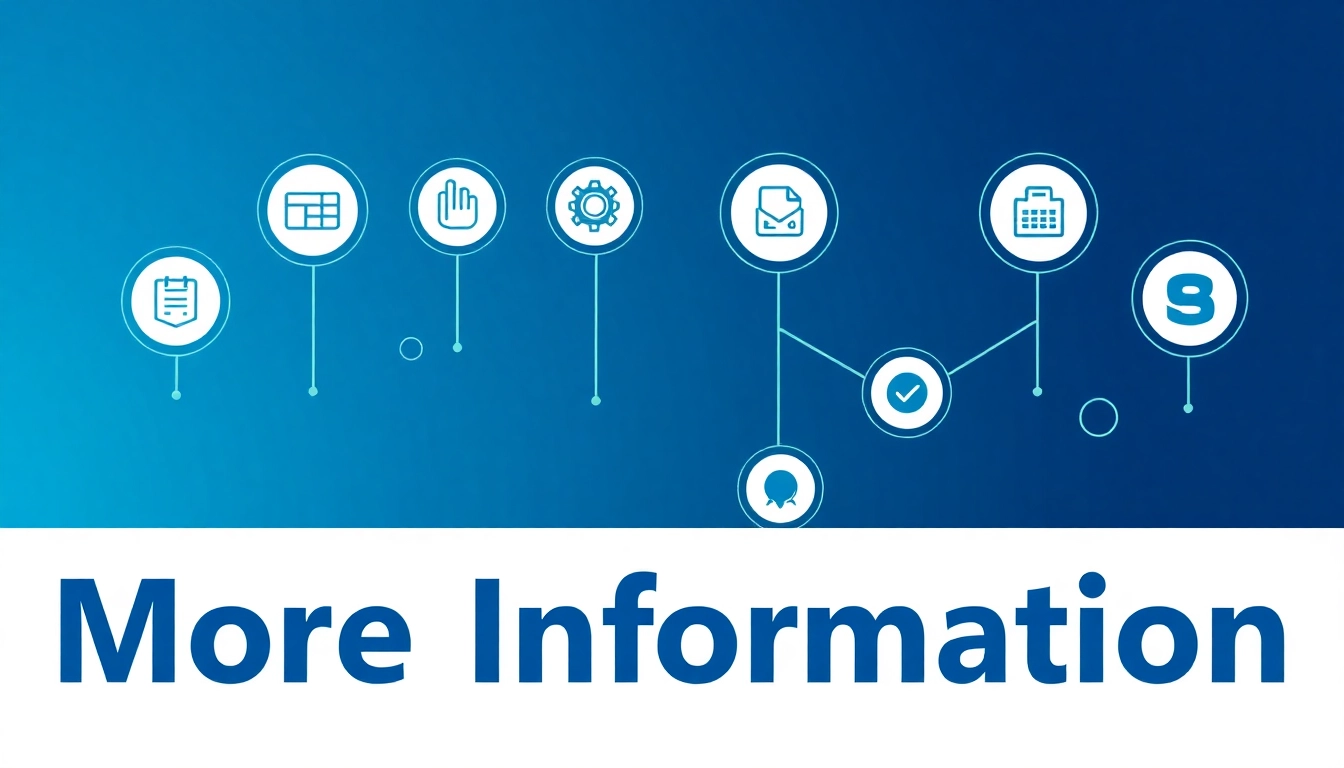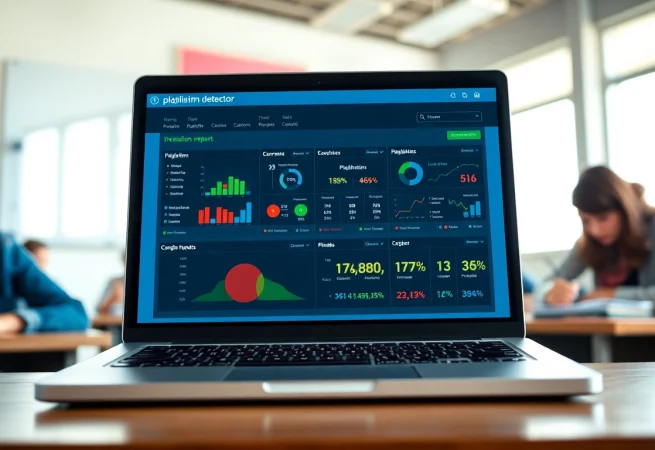

Comprehensive Guide to Selecting the Right Plagiarism Detector for Your Needs
Understanding Plagiarism Detectors
In the digital age, the integrity of written content is critical, whether for academic purposes, professional publishing, or leisure writing. Plagiarism, defined as the act of using someone else’s work, ideas, or expressions without proper attribution, can lead to serious consequences in various fields. This makes the role of a plagiarism detector invaluable. These tools not only help in identifying copied material but also assist in fostering a culture of originality and ethical writing practices. Understanding how they function and their importance can empower users to make informed choices in their writing endeavors.
What is a Plagiarism Detector?
A plagiarism detector is a software tool or service designed to analyze texts for similarities to other known sources. It helps authors and educators ascertain whether a given piece contains original content or if it borrows excessively from other works. Plagiarism detectors utilize algorithms and databases to check submitted documents against a plethora of online and offline resources, producing a report that indicates the percentage of originality and flagged areas that may require citation or revision.
How Do Plagiarism Detectors Work?
Most plagiarism detectors work through a multi-step process:
- Text Submission: Users submit their text, usually by copy-pasting or uploading a document.
- Database Scanning: The software scans the text against a massive database, which can include articles, websites, academic papers, and even previous submissions.
- Algorithm Analysis: Advanced algorithms analyze the text, looking for matches or similarities in phrasing, sentence structure, and overall content.
- Report Generation: The detector produces a report detailing matches found, along with a similarity percentage and sources from which the matches were drawn.
This process ensures that authors can identify potential plagiarism and take corrective action before publication or submission.
Importance of Using a Plagiarism Detector
The importance of utilizing a plagiarism detector cannot be overstated:
- Protecting Academic Integrity: For students, maintaining originality in assignments is crucial for upholding academic standards and personal integrity.
- Avoiding Legal Issues: For professionals and businesses, plagiarism can lead to legal disputes and damage reputations.
- Enhancing Writing Skills: Regularly checking work for unintended plagiarism can help authors improve their writing habits and referencing skills.
- Fostering Originality: By using these tools, writers can shift their focus to creating unique content that adds value to the discourse in their field.
Features to Look for in a Plagiarism Detector
When choosing a plagiarism detector, several features can enhance the user’s experience and ensure effectiveness. Here are crucial aspects to consider:
Accuracy and Reliability
The accuracy of a plagiarism detector is paramount. Look for tools that provide a comprehensive database and reliable algorithms to ensure a high detection rate of copied content. User reviews and academic endorsements can often indicate reliability, revealing how well the detector performs in real-world scenarios.
User-Friendly Interface
A user-friendly interface allows even the most tech-challenged individuals to navigate the tool effortlessly. Features such as simple uploading options and clear reporting layouts contribute to a more positive user experience.
Supported File Formats and Word Limits
Some plagiarism detectors only accept certain file formats or impose specific word limits, which can affect their usability. Verify that the tool supports your required formats (e.g., .doc, .pdf, .txt) and consider your typical text lengths.
Top Plagiarism Detectors to Consider
With so many plagiarism detectors available, selecting the right one can be a daunting task. Here’s a breakdown of some of the top options in the market:
Comparing Free and Paid Options
Many plagiarism detectors offer free versions alongside premium services. Free tools are often limited in functionality—such as fewer comparisons or less comprehensive databases—while paid options typically provide deeper scanning, more features, and customer support. Examples of popular detectors include:
- Grammarly: Known for its grammar checking capabilities, it also offers a powerful plagiarism detection feature in its premium version.
- Turnitin: Widely used in educational institutions, it has extensive databases and is reliable for academic text checking.
- DupliChecker: This free tool allows users to quickly check documents and offers some premium features if needed.
User Reviews and Ratings
Before committing to any tool, researching user reviews and ratings can provide insight into the software’s effectiveness and user satisfaction. Websites and platforms that aggregate reviews can serve as beneficial resources for comparing different tools based on actual user experiences.
Unique Features and Benefits
Some plagiarism detectors provide unique features such as:
- AI Content Detection: Some advanced tools now incorporate AI technology to identify and flag AI-generated content, clarifying the originality of submissions.
- Integration Options: Certain tools can be integrated with learning management systems (LMS) or writing tools, streamlining the editing process.
- Student-Friendly Editions: Tools like PapersOwl offer special versions tailored for students, focusing on reports that help in learning proper citation and referencing.
Common Mistakes When Using a Plagiarism Detector
While plagiarism detectors are powerful tools, users often make mistakes that can undermine their effectiveness. Awareness of these common pitfalls is crucial for maximizing the value derived from these services:
Misinterpreting Results
One of the most significant issues arises when users misinterpret the results. A high similarity percentage does not necessarily indicate plagiarism; it may also reflect common phrases or properly cited material. Users should carefully examine the reports and understand the context of flagged content.
Overreliance on Tools
Another prevailing mistake is overreliance on plagiarism detectors. While these tools are helpful, they should only be one aspect of a thorough editing process. Writers should still engage in careful proofreading and adhere to proper citation protocols to maintain writing integrity.
Ignoring Proper Citation Practices
Finally, relying solely on a plagiarism detector without learning proper citation practices can lead to repeated issues. Users should familiarize themselves with different citation styles (e.g., APA, MLA, Chicago) to ensure that they can adequately attribute sources in their work.
Maximizing the Benefits of Your Plagiarism Detector
To harness the full potential of plagiarism detectors, users can take several steps to optimize their experience:
Integrating with Workflow
Incorporating the use of a plagiarism detector into your writing workflow can enhance productivity. Consider running a preliminary check as you draft a document and then again before final submission. Regular checks can help identify potential issues early on and allow for time to rephrase or correctly attribute sources.
Enhancing Writing Skills
Moreover, leveraging plagiarism detection reports as learning tools can significantly improve writing skills. By reviewing flagged sections, users can understand which phrases might be too similar to existing works. This awareness can foster creativity and promote better paraphrasing practices.
Balancing Originality and Research
Finally, finding a balance between originality and research is essential. Plagiarism detectors serve as checks but should not deter writers from utilizing existing literature. Instead, they should encourage a thoughtful approach to presenting researched material while ensuring that original interpretations shine through.

Alternative Medizinstudium: Vielfältige Studiengänge und Möglichkeiten für angehende Mediziner
Was ist ein Alternative Medizinstudium?
Definition und Ziele
Ein alternatives Medizinstudium bezieht sich auf Studiengänge, die sich mit der Gesundheit und dem Wohlbefinden von Menschen beschäftigen, aber nicht den traditionellen Weg der ärztlichen Ausbildung einschlagen. Diese Programme zielen darauf ab, Studierenden die Möglichkeit zu geben, gesundheitsbezogene Kenntnisse und Fertigkeiten zu erwerben, die in einer Vielzahl von Berufen Anwendung finden. Suchende nach einem Alternative Medizinstudium können sich für Studienrichtungen wie Physiotherapie, Ergotherapie, Pharmazie oder Psychologie entscheiden. Ziel ist es, sowohl theoretische als auch praktische Fähigkeiten zu entwickeln, um in Gesundheitsberufen aktiv zu werden und Patienten effektiv zu unterstützen.
Unterschiede zum klassischen Medizinstudium
Die wesentlichen Unterschiede zwischen einem klassischen Medizinstudium und einem alternativen Medizinstudium betreffen sowohl den Lehrinhalt als auch die Ausbildungsziele. Während das traditionelle Medizinstudium stark auf die Ausbildung von Ärzten fokussiert ist und durch rigorose medizinische Ausbildung und klinische Praktika gekennzeichnet ist, bieten alternative Medizinstudiengänge eine breitere Palette an Themen und Perspektiven. Studierende in diesen Programmen legen oft Wert auf einen praktischen Ansatz zur Gesundheitsversorgung und nutzen interdisziplinäre Lehrmethoden, um sowohl die physiologischen als auch die psychologischen Aspekte der Patientenbetreuung zu verstehen.
Wachstum der Alternativen in der Bildung
In den letzten Jahren ist ein deutlicher Anstieg an alternativen Bildungsangeboten im Gesundheitsbereich zu verzeichnen. Dies ist auf mehrere Faktoren zurückzuführen, darunter ein wachsendes Bewusstsein für die Bedeutung ganzheitlicher Gesundheitsversorgung und ein steigendes Interesse an Berufen, die Patientenkontakt bieten, ohne dass ein klassischer Ärzteeintritt notwendig ist. Universitäten und Fachhochschulen haben darauf reagiert, indem sie innovative Studiengänge und Programme entwickeln, die auf diese Trends abzielen. Diese Bewegung wird auch durch staatliche Förderprogramme und eine stärkere Akzeptanz alternativer Therapien in der Gesellschaft unterstützt.
Beliebte Ausbildungsmöglichkeiten im Gesundheitsbereich
Physiotherapie und Ergotherapie
Physiotherapie und Ergotherapie sind zwei der bekanntesten alternativen Studiengänge im Gesundheitssektor. Diese Berufe konzentrieren sich darauf, die Funktionalität und Lebensqualität von Patienten zu verbessern.
Physiotherapeuten arbeiten mit Patienten, die sich von Verletzungen oder Krankheitszuständen erholen, um deren Bewegungsfähigkeit zu fördern und Schmerzen zu lindern. Zu den Ausbildungsinhalten gehören Anatomie, Physiologie, spezielle Behandlungstechniken und Rehabilitation.
Ergotherapeuten hingegen helfen Menschen, tägliche Aktivitäten zu meistern, die durch körperliche, psychische oder soziale Einschränkungen beeinträchtigt sind. Das Studium umfasst sensible soziale und psychologische Komponenten, um individuelle Therapieansätze entwickeln zu können.
Pharmazie und Biochemie
Pharmazie und Biochemie bieten Studierenden die Möglichkeit, tiefere Kenntnisse über Medikamente und deren Wirkungsweise zu erlangen. Die Pharmazie als Disziplin beschäftigt sich mit der Entwicklung und Abgabe von Arzneimitteln, während die Biochemie ein fundamentales Verständnis der chemischen Prozesse in lebenden Organismen vermittelt. Diese Studiengänge sind entscheidend für diejenigen, die an der Schnittstelle von Medizin und Chemie arbeiten möchten, insbesondere in der Entwicklung neuer Arzneimittel oder in der klinischen Forschung.
Psychologie und Gesundheitswissenschaften
Das Studium der Psychologie zielt darauf ab, das menschliche Verhalten und die mentalen Prozesse zu verstehen und zu beeinflussen. Im Kontext von Gesundheitswissenschaften wird der Schwerpunkt auf die psychologischen Aspekte der Gesundheit gelegt. Studierende lernen, wie psychische Gesundheit in die allgemeine Gesundheitsversorgung integriert werden kann. Gesundheitswissenschaften erreichen einen interdisziplinären Ansatz und beziehen viele Aspekte von Gesundheitsversorgung, Prävention und Gesundheitsförderung ein.
Karrierechancen nach einem Alternativen Medizinstudium
Berufsfelder in der Gesundheitsbranche
Die beruflichen Möglichkeiten für Absolventen eines alternativen Medizinstudiums sind vielfältig. Sie können in klinischen Einrichtungen, Rehabilitationszentren, Praxen oder auch in der Gemeinschaftsmedizin arbeiten. Berufe in der Forschung und Lehre sind ebenfalls mögliche Karrieren. Die Nachfrage nach Gesundheitsdienstleistern, die ein ganzheitliches Verständnis für die Patientenversorgung anbieten, nimmt stetig zu. Daher sind Absolventen in diesen Bereichen sehr gefragt.
Wachstum der medizinischen Begleitberufe
Mit dem wachsenden Bewusstsein für die Bedeutung von patientenorientierter Versorgung steigt auch das Interesse an medizinischen Begleitberufen. Diese Berufe umfassen nicht nur Therapiefunktionen, sondern auch Rollen im Management und in der Forschung. Berufe wie Gesundheitsmanager, Klinische Studienkoordinatoren oder auch Fachkräfte in der Präventivmedizin gewinnen zunehmend an Bedeutung. Für Studierende ist es wichtig, sich der Entwicklung des Arbeitsmarktes bewusst zu sein, um Ihre Karriere so optimal wie möglich zu planen.
Anforderungen und Perspektiven
Die Anforderungen für die Zulassung zu alternativen Medizinstudiengängen können je nach Fachrichtung stark variieren. Häufig sind Abitur oder eine gleichwertige Vorbildung notwendig, wobei viele Universitäten auch praktische Erfahrungen oder ein Motivationsschreiben erwarten. Die Perspektiven nach Abschluss sind in der Regel vielversprechend, da der Gesundheitssektor kontinuierlich wächst und diversifiziert. Studierende können erwarten, nach dem Studium attraktive Arbeitsplätze in einem dynamischen Umfeld zu finden.
Vorteile eines alternativen Medizinstudiums
Praktische Erfahrungen und Patientenkontakt
Einer der Hauptvorteile eines alternativen Medizinstudiums ist die Möglichkeit, praktische Erfahrungen und direkten Patientenkontakt zu sammeln. Dies ermöglicht es den Studierenden, ihre Kenntnisse in realen Situationen anzuwenden und Soft Skills wie Empathie und Kommunikation zu entwickeln. Praktika, Kliniken und Laborerfahrungen sind Teil der meisten Studiengänge, was die Theorie mit der Praxis verknüpft und die Verantwortung der Studierenden in der Patientenversorgung fördert.
Flexibilität und Vielfalt der Studiengänge
Alternative Medizinstudiengänge bieten eine größere Flexibilität in der Studiengestaltung. Studierende haben oft die Möglichkeit, sich auf bestimmte Interessensgebiete zu spezialisieren oder Wahlmodule zu wählen, die ihren individuellen Karrierezielen entsprechen. Diese Vielfalt ermöglicht es den Studierenden, ein Fachgebiet zu wählen, das nicht nur ihren Talenten und Interessen entspricht, sondern auch den sich ständig verändernden Anforderungen der Gesundheitsbranche gewachsen ist.
Persönliche Entfaltung und berufliche Zufriedenheit
Die Entscheidung für ein alternatives Medizinstudium kann auch eine tiefgreifende persönliche Entfaltung fördern. Viele Studierende fühlen sich von der Möglichkeit, direkt Einfluss auf das Leben von Menschen zu nehmen, angezogen. Die Arbeit in der Gesundheitsbranche kann sehr erfüllend sein, vor allem, wenn es darum geht, anderen zu helfen und positive Veränderungen zu bewirken. Dies führt häufig zu einer hohen beruflichen Zufriedenheit und einem starken Engagement für den eigenen Beruf.
Tipps zur Wahl des richtigen Studiengangs
Selbstreflexion und Interessenanalyse
Bevor man sich für einen Studiengang im Bereich alternative Medizin entscheidet, ist es wichtig, sich über die eigenen Interessen und Ziele klar zu werden. Eine Selbstreflexion, in der man sich fragt, welche Aspekte der Gesundheitsversorgung einem besonders wichtig sind, kann dabei helfen, die richtige Entscheidung zu treffen. Zudem kann es sinnvoll sein, sich mit verschiedenen Berufen in der Gesundheitsbranche vertraut zu machen, um herauszufinden, welche Tätigkeiten einem am meisten zusagen.
Marktforschung der Ausbildungsangebote
Eine umfassende Marktforschung hilft, die besten Ausbildungsangebote zu finden. Dabei sollte man sich über die verschiedenen Universitäten und deren Studiengänge informieren, Erfahrungsberichte lesen und sich über die beruflichen Perspektiven nach Abschluss des Studiums erkundigen. Wichtige Faktoren können auch die Qualität der Lehre, die Ausstattung der Universitäten und die beruflichen Netzwerke sein, die durch die Studiengänge entstehen.
Gespräche mit Studienberatern und Absolventen
Eine weitere wichtige Maßnahme ist das Führen von Gesprächen mit Studienberatern oder Absolventen der jeweiligen Studiengänge. Diese Personen können wertvolle Einblicke in den Studienalltag, die Herausforderungen und die Karriereaussichten bieten. Dadurch erlangt man ein besseres Verständnis für die Erwartungen des Studienganges und kann informierte Entscheidungen treffen.

How to Buy a Master Degree in the UK: Everything You Need to Know
Understanding the Demand for Master’s Degrees
In today’s fast-paced and competitive job market, the ambition for academic advancement is more pronounced than ever. Professionals are increasingly turning to higher education as a means to propel their careers forward. With the rise in the demand for specialized knowledge and skills, many seek to buy master degree uk to enhance their employability and competitiveness. This article explores the various facets of obtaining a master’s degree in the UK, shedding light on the prevailing trends, types of degrees available, processes involved in acquiring these qualifications, financial implications, and the long-term benefits of making an informed choice.
The Role of Higher Education in Career Advancement
The integration of advanced qualifications into career paths has never been more vital. Higher education plays a pivotal role in equipping individuals with the necessary skills and knowledge to excel in their chosen fields. Employers increasingly prioritize candidates with master’s degrees, as these degrees signal a commitment to professional development, specialized competencies, and advanced analytical skills. Additionally, higher education often correlates with higher earning potential. According to various studies, individuals with master’s degrees tend to earn significantly more than those with only bachelor’s degrees throughout their careers.
Trends in Online and Traditional Learning
The landscape of education is undergoing a transformation, particularly with the advent of digital learning platforms. Online programs have surged in popularity, offering flexibility and accessibility that traditional on-campus learning simply cannot match. Prospective students now have an array of options, from fully online programs to hybrid models incorporating both online and face-to-face components. The appeal of online learning lies in the ability to study at one’s own pace and the elimination of geographical barriers, allowing students from all over the world to access UK universities’ reputable programs.
Why Professionals Buy Master Degrees UK
Professionals opt to purchase master’s degrees in the UK for several reasons. A significant motivating factor is acceleration in career progression—individuals are looking for ways to stand out in the job market. The acquisition of a master’s degree can open new doors to higher-level positions, especially in fields like business, healthcare, and technology. Moreover, the rigorous nature of these programs often provides not only theoretical knowledge but also practical skills, thus making graduates more marketable. Ultimately, the decision to buy a master’s degree often reflects a strategic investment in one’s career trajectory.
Types of Master’s Degrees Available in the UK
Online vs. On-Campus Options
The decision between online and on-campus master’s degree programs significantly impacts the learning experience and outcomes. Traditional on-campus programs provide immersive learning environments with direct interaction among students and faculty. This setting fosters networking opportunities and collaboration on group projects, crucial for developing interpersonal skills. Conversely, online programs offer unparalleled flexibility, accommodating the schedules of working professionals. Many prestigious universities now offer fully accredited online master’s degrees that maintain the same rigor as on-campus programs.
Specializations and Their Market Value
Specializing in a particular field can significantly enhance the value of a master’s degree. In the UK, common specializations in business (such as MBA), healthcare (such as Master’s in Public Health), technology (such as Master’s in Data Science), and education (such as Master’s in Education) are gaining traction. Research shows that specialized degrees often enable graduates to command higher salaries and open doors to niche job markets, thus providing a competitive edge in hiring processes. The growing demand for specific skill sets necessitates that professionals choose their specializations wisely based on industry trends and personal career goals.
Recognized Institutions for Degree Acquisition
When considering where to buy a master’s degree in the UK, the choice of institution is paramount. Recognized universities such as the University of Oxford, University of Cambridge, and Imperial College London offer programs that are highly regarded globally. These institutions have established reputations for academic excellence and rigorous quality assurance processes that ensure graduates possess the necessary skills and knowledge. Additionally, many universities are undergoing continual improvement to align their programs with industry expectations, making them an attractive option for prospective students.
The Process of Buying a Master Degree in the UK
Steps to Obtain a Legitimate Degree
Obtaining a legitimate master’s degree involves navigating several steps that ensure the degree is authentic and recognized. First, prospective students should research available programs that align with their career aspirations and educational background. This includes reviewing course content, faculty credentials, and graduation rates. Next, contacting admission offices for clarity on the application process and requirements, including deadlines, materials, and prerequisite qualifications is essential. Upon acceptance, students typically complete coursework followed by a dissertation or capstone project depending on their chosen program.
Understanding Accreditation and Legitimacy
Accreditation is a critical aspect when purchasing a master’s degree. Students must ensure that the institutions they consider are accredited by the appropriate bodies recognized in the UK, such as the Quality Assurance Agency for Higher Education (QAA). Accreditation signifies that the institution meets established standards of educational quality and rigor. This validation not only increases the degree’s value but is often a requirement for employers scrutinizing educational qualifications during the hiring process.
Checking the Credibility of Degree Providers
With numerous options available, verifying the credibility of degree providers is a vital step. This involves investigating the institution’s history, academic reputation, and alumni outcomes. Engaging with alumni and current students can offer insights into the learning experience and the degree’s impact on their career trajectories. Moreover, reviewing external accreditation and ranking reports can help gauge the institution’s standing relative to its peers.
Cost Considerations When Buying a Master Degree in the UK
Average Prices and Payment Options
The cost of acquiring a master’s degree in the UK varies widely based on factors such as university reputation, program length, and whether the student is domestic or international. On average, tuition fees range from £10,000 to £35,000, with prestigious institutions often charging higher amounts. Payment options include direct payment plans, student loans, and employer-sponsored education programs. Many universities also offer installment payment plans for tuition fees, helping students manage the financial burden better.
Financial Aid and Scholarships for International Students
International students seeking to buy a master’s degree in the UK have access to various financial aid options. Scholarships, grants, and bursaries offered by universities and external organizations can significantly offset tuition costs. Numerous scholarships are designed specifically for foreign students, such as the Chevening Scholarships, which encourage academic excellence and reward leadership potential. Additionally, some universities provide hardship funds for those facing sudden financial difficulties during their studies, ensuring that deserving candidates can complete their education without finances being a barrier.
Hidden Costs of Fast-Track Degree Programs
While fast-track degree programs promise rapid completion of a master’s degree, they often come with hidden costs. Prospective students should consider the potential for increased tuition rates due to the condensed timeframe and the necessity of extending study hours, which could impact work commitments and earning potential. Additionally, the rigorous nature often requires supplementary materials, resources, and even additional support services like tutoring or counseling. Understanding these aspects is vital to making an informed decision regarding program selection.
Making an Informed Decision
Evaluating Your Career Goals and Needs
Before committing to a master’s program, it’s crucial to undertake a self-assessment of career goals, preferred learning styles, and personal circumstances. Prospective students should determine how a specific degree aligns with long-term career aspirations. For instance, individuals looking to enter the corporate world may benefit more from an MBA, while those aiming for specialized roles in healthcare would find a master’s in a related field more applicable. Self-awareness about personal and professional needs can guide the decision-making process effectively.
Consulting Alumni and Current Students
Consulting with alumni and current students can provide invaluable insight into the culture, curriculum, and overall experience of a program. Social media platforms and professional networks like LinkedIn can serve as excellent resources for connecting with graduates. Through these interactions, prospective students can ask about the program’s strengths and weaknesses, opportunities for networking, and real-world applications of the knowledge gained. These insights can greatly influence the decision-making process, helping candidates discern which program promises the best return on their investment.
Long-Term Benefits of a Purchased Degree
Investing in a master’s degree can yield substantial long-term benefits measured not just in salary increases but also in job satisfaction and career advancement. Graduates often find that their degree opens pathways to positions that offer greater responsibility, leadership opportunities, and the potential to influence industry practices. Furthermore, the expansive network and connections made during the study can facilitate strategic career moves and collaborations long after graduation, making the pursuit of a master’s degree a worthwhile endeavor.

Enhance Your Writing with a Reliable Plagiarism Checker Tool
Understanding Plagiarism and Its Consequences
Plagiarism is a critical concern in academic, professional, and creative fields alike. As the internet has expanded access to information, the ease with which individuals can copy others’ work has increased, making it essential to understand not only what constitutes plagiarism but also how to prevent it. This article delves into the complexities of plagiarism, its consequences, and how tools like a plagiarism checker can help uphold integrity in writing.
What is Plagiarism?
Plagiarism, at its core, refers to the improper quotation or redistribution of someone else’s work, ideas, or expressions without appropriate attribution. It can manifest in several ways, including copying text verbatim, paraphrasing without credit, or even reusing one’s own previous work without acknowledgment, known as self-plagiarism. Understanding plagiarism involves recognizing not just the act of copying but the ethical implications surrounding it and the importance of originality in both academic and professional landscapes.
Types of Plagiarism
Plagiarism can be categorized into multiple types, each with specific implications:
- Direct Plagiarism: Copying someone else’s work word-for-word without attribution.
- Self-Plagiarism: Reusing material from one’s past publications without acknowledgment.
- Complete Plagiarism: Submitting an entire work as one’s own that has been written by someone else.
- Paraphrasing Plagiarism: Rewording someone else’s ideas or work without proper citation.
- Mosaic Plagiarism: Blending copied phrases from different sources into one’s work without appropriate attribution.
- Accidental Plagiarism: Unknowingly failing to cite, misquoting, or paraphrasing without recognition due to lack of knowledge.
The Importance of Originality in Writing
Originality in writing is paramount across all fields, as it reflects critical thinking and creativity. Academic integrity relies heavily on the acknowledgment of sources, which fosters a respect for intellectual property. In professional settings, originality can contribute to innovation and advancements in various sectors. Therefore, knowing how to produce original content and properly credit sources is essential for anyone involved in writing.
How a Plagiarism Checker Works
Plagiarism checkers are essential tools designed to detect instances of plagiarism in text accurately. These tools analyze documents through a set of algorithms, comparing texts against a database of existing materials. They help users ensure that their writing is both original and free from unintentional plagiarism.
Key Features of Effective Plagiarism Checkers
When selecting a plagiarism checker, consider the following essential features:
- Database Size: A comprehensive database that includes academic publications, online articles, and a wide array of content sources increases accuracy.
- Real-Time Scanning: Effective checkers offer instant results and highlight plagiarized content.
- Detailed Reports: Clear reports that illustrate the percentage of similarity, original sources, and areas requiring citation provide helpful guidance.
- User-Friendliness: A simple, intuitive interface can enhance user experience.
- Multiple Format Support: Compatibility with various file formats (e.g., PDF, DOCX) is crucial for flexibility in use.
Understanding Similarity Reports
Once a text is scanned, a similarity report is generated. This report will often provide a percentage indicating how much of the text matches known sources. It can also highlight specific sections that match other texts or publications. Understanding how to read these reports can aid in making necessary revisions and ensuring a higher level of originality.
Technology Behind Plagiarism Detection
Plagiarism detection tools employ advanced algorithms and artificial intelligence to analyze text. These technologies assess lexical and semantic similarities, enabling the identification of paraphrased content or conceptually similar ideas. Moreover, machine learning can refine the detection process, continuously improving the effectiveness of the checkers over time.
Choosing the Right Plagiarism Checker for You
Selecting a plagiarism checker requires careful consideration to ensure it meets your unique needs. Factors such as budget, specific features, and user needs should guide your decision.
Comparing Free vs. Paid Plagiarism Checkers
Free plagiarism checkers can offer basic features suitable for casual users, but they often lack the comprehensiveness and reliability of paid options. Paid tools typically provide deeper scans, accessing extensive databases, and generating more detailed reports. Evaluate your requirements to determine which option best fits your situation.
Top Features to Consider
When evaluating plagiarism checkers, prioritize the following features:
- Accuracy: Choose a tool known for its precision in detecting plagiarism.
- Speed: Consider tools that offer rapid results, particularly for bulk text analysis.
- User Reviews: Look for reviews and testimonials to gauge user satisfaction and effectiveness.
- Integration: Some tools provide integration with writing platforms, making the checking process seamless.
User Reviews and Ratings
Checking user reviews can be highly informative. Look for feedback on the accuracy, ease of use, customer service, and overall satisfaction levels. Many independent review sites and feedback forums can provide insights into the user experience with various plagiarism checkers.
Best Practices for Avoiding Plagiarism
While tools like plagiarism checkers are invaluable for detecting issues after writing, they are not a substitute for good writing practices. Implementing effective strategies can help avoid plagiarism in the first place.
Proper Citation and Referencing
Understanding and correctly applying citation styles (such as APA, MLA, or Chicago) are crucial for attributing sources faithfully. Familiarize yourself with the conventions of your chosen style and consistently apply them to all materials referenced in your work.
Paraphrasing Techniques
Successful paraphrasing means not just changing a few words but reorganizing the structure of the original content while conveying the same ideas. This aids in expressing your understanding of a subject while also avoiding plagiarism. Practicing these techniques will result in a more authentic writing style.
Utilizing Writing Resources
Numerous writing resources are available to assist in creating original content. These include writing centers, guides, and online resources that provide insights into effective writing practices. Taking advantage of these can significantly mitigate the risks of plagiarism.
Future Trends in Plagiarism Detection
As technology advances, the landscape of plagiarism detection continues to evolve. Staying attuned to emerging trends will be crucial for integrating new solutions into your writing workflow.
AI in Plagiarism Checking
Artificial intelligence (AI) is increasingly utilized in plagiarism detection. AI-powered tools can learn from previous data, improving their ability to detect nuanced instances of plagiarism, including paraphrasing and concept similarity.
Evolving Standards in Academic Integrity
With the rise of digital content, concepts of academic integrity are continuously evolving. Institutions are increasingly implementing stricter measures against plagiarism, leading to new guidelines and expectations in how original work is defined and assessed.
New Tools and Technologies on the Horizon
As detection methods evolve, new tools equipped with enhanced features will become available. Innovations may include more sophisticated algorithms that detect even more nuances in writing, software that classifies types of plagiarism, or collaborative platforms that promote ethics in writing and research.

Elevate Your Skills with Insights from https://www.informaticsview.com
Understanding the Importance of Digital Information
In today’s fast-paced world, access to digital information is more critical than ever. As our lives become increasingly intertwined with technology, the ability to navigate and utilize online resources effectively greatly enhances both personal and professional development. Digital literacy is not merely a bonus skill but a necessity for thriving in the modern knowledge economy. At https://www.informaticsview.com, robust discussions around digital literacy highlight its integral role in shaping informed citizens capable of making sound decisions in various aspects of their lives.
Why Digital Literacy is Crucial
Digital literacy encompasses a range of skills including searching for information, evaluating sources for credibility, and understanding how to use digital tools to communicate and collaborate. A digitally literate individual can:
- Identify reliable sources of information amidst a sea of misinformation.
- Use digital devices efficiently for problem-solving and creativity.
- Participate actively in society by engaging in discussions with informed opinions.
Moreover, with the influx of data in our daily lives, digital literacy facilitates critical thinking, enabling individuals to discern facts from opinions, an essential proficiency in an era where misinformation spreads rapidly.
Common Challenges in Information Access
Despite the omnipresence of digital information, various hurdles impede access and comprehension. These challenges include:
- Lack of coherent digital skills, particularly among older populations.
- Information overload, where the abundance of content leads to confusion and difficulty in decision-making.
- Technological barriers, including access to devices and reliable internet connections.
Tackling these issues requires targeted initiatives aimed at promoting digital literacy, ensuring that everyone has the opportunity to engage with and benefit from available digital resources.
Effective Strategies for Navigating Online Resources
In light of the challenges encountered in information access, several strategies can significantly enhance the ability to navigate online resources effectively:
- Utilize Advanced Search Techniques: Being proficient in using search engines allows for more refined queries that filter out irrelevant content.
- Join Online Courses: Many educational platforms offer courses on digital literacy that can help improve your skills.
- Engage with Online Communities: Participating in forums and groups can provide support and insights from peers facing similar challenges.
By implementing these strategies, individuals can foster a more profound engagement with digital information, ultimately leading to personal and professional empowerment.
Innovative Approaches to Building Knowledge
Utilizing Online Platforms to Expand Your Expertise
Online platforms have revolutionized the way individuals acquire knowledge. Websites like Coursera, edX, and Khan Academy offer diverse courses across a myriad of subjects, often taught by industry leaders and professors from renowned institutions. Here’s how to maximize learning through these platforms:
- Identify Your Learning Style: Some individuals prefer visual learning through videos, while others may absorb information better through reading.
- Schedule Regular Learning Times: Treat online learning like a class by scheduling dedicated time for coursework.
- Engage in Discussions: Many platforms have discussion boards; actively participating enhances comprehension and retention.
Online platforms create a flexible and rich environment for gaining expertise, making it easier than ever to acquire new skills and knowledge.
Adopting a Lifelong Learning Mindset
A hallmark of successful individuals is a commitment to continuous learning. Embracing this mindset involves recognizing that education does not end with formal schooling. To foster lifelong learning:
- Embrace Curiosity: Cultivate a natural curiosity about the world and a desire to learn from every experience.
- Seek Feedback: Create opportunities for receiving constructive criticism, which can highlight areas for improvement.
- Reflect on Learning Experiences: Take time to evaluate what you’ve learned and how it can be applied in different contexts.
By adopting a lifelong learning approach, individuals position themselves to adapt to change and seize new opportunities as they arise.
Leveraging Community for Continuous Growth
Community plays a vital role in learning and personal development. Engaging with others allows for shared experiences and collaborative growth. Ways to leverage community include:
- Attend Workshops and Meetups: Participate in local events to connect with like-minded individuals and share knowledge.
- Form Study Groups: Collaborate with peers to discuss concepts and deepen understanding through conversation.
- Mentorship: Seek opportunities to learn from experienced professionals who can provide insights and guidance.
Communities foster a supportive learning environment, encouraging individuals to challenge themselves and grow.
Best Practices for Consuming Information
Identifying Credible Sources
In an age where anyone can publish information, discerning credible sources is vital. Here are strategies to evaluate sources effectively:
- Check the Author’s Credentials: Ensure that the author has expertise in the subject matter without biases.
- Look for Peer-Reviewed Articles: Articles published in academic journals are generally reliable and vetted by experts.
- Examine the Date of Publication: Timeliness is crucial; old information may not be relevant or accurate anymore.
These best practices equip you to sift through the vast amounts of information available and focus on those that add genuine value to your knowledge base.
Organizing Your Learning Materials Effectively
Effective organization of learning materials can enhance efficiency and retention. Consider these techniques:
- Utilize Digital Tools: Use apps like Evernote or Notion to keep notes and resources neatly organized.
- Create Summaries: After consuming information, summarize key points and insights to reinforce what you’ve learned.
- Set Up a Filing System: Develop a system for categorizing materials based on subjects, projects, or themes.
By organizing learning materials, individuals can easily access information and connect concepts, leading to a more effective learning process.
Implementing Note-Taking Techniques that Work
Effective note-taking is crucial for information retention. Here are several techniques that can enhance your note-taking process:
- The Cornell Method: Divide your notes into summaries, cues, and detailed sections to streamline review.
- Mind Mapping: Visual representations can help organize thoughts and show relationships between concepts.
- Bullet Journaling: Combine organization and creativity in a system that fits your personal style.
Experimenting with various note-taking techniques can lead to the discovery of a method that best suits your learning style, aiding information retention and recall.
Measuring Your Knowledge Progress
Setting Clear Educational Goals
Establishing specific, measurable, achievable, relevant, and time-bound (SMART) goals is foundational to tracking educational progress. Goals should challenge you while remaining attainable. To set effective goals:
- Define Clear Objectives: Identify what you want to learn and why.
- Break Down Goals: Divide larger goals into manageable tasks to maintain motivation.
- Regularly Review Progress: Set aside time to evaluate whether you’re on track to meet your goals.
By developing clear goals, individuals can better monitor their progress and make necessary adjustments to their learning strategies.
Tools for Tracking Your Learning Journey
Utilizing specific tools can streamline the process of tracking educational progress. Some useful platforms and strategies include:
- Learning Management Systems (LMS): Platforms like Moodle or Canvas allow users to track their course progress and assignments.
- Habit-Tracking Apps: Use applications such as Habitica or Coach.me to maintain momentum in achieving educational objectives.
- Reflection Journals: Keeping a learning journal can help in reflecting on what was learned and identifying areas for further exploration.
By employing these tools, individuals can achieve greater visibility into their learning patterns and successes.
Evaluating Skills Through Practical Application
One of the most effective ways to measure knowledge retention and skill acquisition is through practical application. Consider the following methods:
- Projects and Case Studies: Undertake projects that allow you to apply theoretical concepts in real-world scenarios.
- Peer Teaching: Explaining concepts to others can reinforce your understanding and highlight areas needing improvement.
- Self-Assessment: Create quizzes or surveys to evaluate your understanding of topics.
Incorporating practical applications into your learning journey fosters deeper understanding and enhances retention of knowledge.
Future Trends in Information Studies
Emerging Technologies Shaping Learning
As we move forward, several emerging technologies are set to shape the future of learning:
- Artificial Intelligence: AI can personalize learning experiences, tailoring resources and recommendations to individual needs.
- Virtual and Augmented Reality: These technologies enhance engagement and immersion in educational content.
- Blockchain for Credentialing: Secure and transparent credentialing systems will help learners authenticate their skills and knowledge.
By embracing these technologies, educational institutions can enhance learning experiences, making them more engaging and relevant.
Preparing for Changes in Digital Literacy Requirements
The digital landscape is ever-evolving, and as such, there will be changes to digital literacy requirements. Anticipating these changes entails:
- Staying Informed: Keep abreast of new digital tools and trends to remain relevant in the workforce.
- Developing Adaptability: Cultivating a flexible mindset allows individuals to transition smoothly into new technologies and workflows.
- Encouraging Educational Institutions to Innovate: Advocate for curricula that evolve with technological advancements.
Preparation for future changes in digital literacy not only empowers individuals but also enhances workplace competitiveness.
Promoting Inclusivity in Information Access
Inclusivity in information access is essential in ensuring equitable opportunities for all individuals. To promote this inclusivity, consider:
- Advocating for Policy Changes: Support initiatives aimed at increasing access to technology and the internet, especially in underserved communities.
- Creating Inclusive Content: Design materials that are accessible to all, regardless of their learning or physical capabilities.
- Providing Digital Literacy Training: Facilitate workshops focused on digital skills for diverse populations.
By championing inclusivity efforts, society can ensure that everyone has the opportunity to engage with and leverage digital information.

Maximize Success: Harnessing Homeworkmarket for Academic Achievement
Understanding the Homeworkmarket Advantage
What is Homeworkmarket?
Homeworkmarket is an innovative online platform designed to connect students with qualified tutors and academic experts, facilitating personalized assistance for a diverse range of subjects and educational challenges. Whether you’re grappling with complex mathematics, delving into the nuances of literature, or preparing for a challenging exam, Homeworkmarket offers a wealth of resources tailored to meet your unique academic needs. This platform provides a user-friendly interface that promotes engagement and eases the navigation of available resources, making it an invaluable tool for students seeking extra academic support.
Benefits of Using Homeworkmarket
Using Homeworkmarket offers numerous advantages that cater to the evolving demands of students in today’s educational landscape. Some of the primary benefits include:
- Access to Expert Tutors: Homeworkmarket connects students with expert tutors who have specialized knowledge in various fields, ensuring that users receive quality assistance.
- 24/7 Availability: The platform operates around the clock, allowing students to seek help at any time, catering to their schedules and urgent needs.
- User-Friendly Interface: The intuitive design of the platform makes it easy for students to navigate and find the exact help they need without hassle.
- Diverse Learning Resources: From textbooks to video tutorials, Homeworkmarket provides a multitude of resources, including practice problems and step-by-step solutions.
- Flexible Pricing: With varied pricing options based on tutor expertise and service types, Homeworkmarket makes quality education accessible to a broad range of budgets.
User Testimonials and Case Studies
The effectiveness of Homeworkmarket is reflected in the success stories of its users. Many students have reported significant improvements in their grades and understanding of subjects after utilizing the platform’s services. For instance, a case study involving a high school student struggling with calculus demonstrated how tailored tutoring sessions greatly enhanced problem-solving skills, resulting in a 20% increase in the student’s overall math grade. Testimonials often highlight the professionalism and knowledge of tutors, with students feeling more confident in their abilities after engaging with the platform.
Navigating Homeworkmarket’s Features
How to Get Started on Homeworkmarket
Getting started on Homeworkmarket is a straightforward process. New users need to create an account by providing basic information and selecting their educational level. Once registered, students can explore available tutors, read their profiles, and choose the right fit based on expertise and reviews. The platform guides users through setting up their request for help, making the initial experience seamless.
Connecting with Tutors
Once registered, connecting with a tutor involves a simple search based on subject, availability, and teaching style. Users can evaluate potential tutors through reviews and ratings, facilitating informed choices. Communication can occur through the platform’s messaging system, ensuring privacy while allowing for direct interaction. This feature fosters a collaborative environment, enabling students to discuss their specific needs and goals with potential tutors.
Using Homeworkmarket Effectively for Optimal Results
To maximize the benefits of Homeworkmarket, students should prepare adequately before each session. This includes having specific questions or topics in mind and gathering relevant materials such as textbooks or previous assignments to facilitate a productive session. Setting clear goals for each interaction can further enhance learning outcomes by providing direction and focus.
Common Challenges and Solutions on Homeworkmarket
Addressing User Concerns
Many students might feel apprehensive about utilizing tutoring services for various reasons, such as concerns about the quality of help or the effectiveness of remote learning. Homeworkmarket addresses these concerns through a robust review system, allowing users to gauge tutor effectiveness based on peer feedback. Additionally, the platform offers a satisfaction guarantee, ensuring that users are not left discontent with their experience.
Overcoming Academic Hurdles
Common academic hurdles faced by students include time management, subject comprehension, and the pressure of upcoming exams. Homeworkmarket supports students in overcoming these challenges by allowing them to prioritize subjects needing the most attention. Dedicated tutors can assist with time management strategies, ensuring students stay on track with their coursework and deadlines.
Best Practices for Homeworkmarket Users
To fully benefit from Homeworkmarket, users should adopt best practices such as:
- Regular Engagement: Consistency is key; regular sessions can help reinforce learning and build understanding over time.
- Setting Achievable Goals: Break down larger subjects or assignments into smaller tasks to make the learning process less overwhelming.
- Active Participation: Engage actively during sessions by asking questions and seeking clarification on complex topics.
- Feedback Utilization: Take advantage of the feedback provided by tutors to improve study habits and academic performance continually.
Measuring Success with Homeworkmarket
Tracking Progress and Performance Metrics
Measuring success on Homeworkmarket involves tracking both academic performance and personal growth over time. Many users report improvements by keeping track of grades before and after utilizing tutoring services. Setting benchmarks for success, such as achieving a specific grade or mastering a particular skill, allows for tangible assessments of the tutoring experience’s effectiveness.
User Feedback and Improvements
Homeworkmarket values user feedback, actively seeking input to improve the platform’s services. Regular surveys and feedback forms allow students to share their experiences, leading to ongoing enhancements in tutor selection and resource availability. Users often express gratitude for being heard, leading to increased satisfaction and platform loyalty.
Case Studies of Academic Growth
Several documented case studies illustrate how Homeworkmarket has transformed academic trajectories. For example, one comprehensive analysis followed a freshman college student studying computer science. Initially overwhelmed, the student sought help through Homeworkmarket, resulting in consistent tutoring sessions. The outcome: improved grades, a greater understanding of complex programming languages, and a newfound passion for the subject—all highlighting the substantial impact of targeted educational support.
Future Trends in Online Homework Help
Anticipating Market Changes for Homeworkmarket
The educational landscape is continually evolving, with online platforms like Homeworkmarket adapting to new trends. Expectations for personalized learning experiences are expected to grow, encouraging the platform to innovate further to meet student needs. As academic demands become more specialized, the integration of niche subject experts will likely become a priority.
Integrating Technology in Homework Help
Technology integration is integral to maximizing online homework help. The emergence of artificial intelligence and machine learning tools can enhance the learning experience by providing personalized study plans, adaptive learning pathways, and even predictive analysis of student performance based on past data. Homeworkmarket is positioned to incorporate these advancements to provide a cutting-edge learning experience for users.
Long-term Benefits of Homeworkmarket Engagement
Engaging with Homeworkmarket offers long-term benefits that extend beyond immediate academic support. By fostering a culture of learning, users develop valuable skills such as critical thinking, problem-solving, and self-discipline. The relationships built with tutors also foster mentorship and professional growth, creating a strong foundation for success in future educational and career pursuits.

Your Guide to Obtaining More Information Effectively and Efficiently
Understanding the Importance of More Information
In an era defined by rapid developments and an overwhelming influx of data, the ability to access and harness more information is not merely advantageous but essential. Delving into the role of information in decision-making processes can provide insights that enhance both personal and professional contexts. Whether you’re navigating a career change, embarking on a new project, or seeking to improve your relationships, understanding the importance of more information can lead to better outcomes.
Why Information Matters
Information is often described as the currency of our time. It empowers individuals and organizations to make informed choices, select appropriate strategies, and avoid costly mistakes. In personal settings, good information can contribute to successful relationships, financial security, and health management. On an organizational level, information serves as the foundation for strategic planning, market analysis, and operational efficiency. The reality is that with the advent of big data and analytics, the importance of employing effective information-gathering techniques has never been more pronounced.
Key Benefits of Gathering More Information
Gathering more information yields numerous benefits. Here are a few:
- Informed Decision-Making: With comprehensive information, you can evaluate more options and make choices that align with your goals.
- Risk Mitigation: Understanding potential downsides or challenges can help you prepare adequately and avoid pitfalls.
- Enhanced Outcomes: Data-driven decisions often lead to superior results compared to those based solely on intuition.
- Increased Confidence: The more informed you are, the more assured you will feel in your choices, whether they pertain to everyday life or critical business strategies.
How Information Shapes Decision-Making
Decision-making is a multifaceted process that is heavily influenced by the quality and quantity of information available. More specifically, informed decision-making entails:
- Understanding Context: Having relevant data illuminates the larger context and helps you anticipate changes in the environment.
- Evaluating Alternatives: Effectively gathering information allows for a robust comparison of possible alternatives, ensuring that you are not limited to a single viewpoint.
- Monitoring Results: Post-decision information gathering allows you to assess the outcomes of your choices and adjust strategies as necessary.
Best Practices for Collecting More Information
Implementing effective information collection strategies can dramatically enhance both the process and outcomes of decision-making. Here are best practices to consider:
Techniques for Effective Information Gathering
Effective information gathering requires a systematic approach:
- Define Your Objectives: Clearly outline what you hope to achieve through your information-gathering efforts. This focus will drive your research.
- Utilize Diverse Sources: Don’t rely solely on one type of source. Combining various formats—such as books, articles, interviews, and online resources—builds a more comprehensive knowledge base.
- Employ Surveys and Questionnaires: Tailored surveys can help gather specific information from a targeted audience, providing primary data that enriches your understanding.
- Attend Workshops and Webinars: Engaging in interactive learning opportunities allows for unprecedented access to expert insights and peer discussions.
Using Technology to Enhance Information Retrieval
In today’s digital age, technology is a powerful ally in information retrieval. Some of the most effective tools include:
- Search Engines: Google and specialized search engines can direct you to a plethora of information across multiple domains.
- Data Analytics Tools: Software tools like Tableau and Google Analytics can help interpret large datasets, making trends and patterns easier to analyze.
- Social Media Platforms: Monitoring platforms like Twitter and LinkedIn offers real-time insights and discussions relevant to your field.
- Research Databases: Accessing academic journals and proprietary databases ensures you stay updated with the latest findings and innovations.
Avoiding Common Pitfalls in Information Collection
While collecting information, be cautious of prevalent pitfalls:
- Over-Reliance on a Single Source: Relying on one perspective can lead to a skewed understanding; always seek multiple viewpoints.
- Ignoring Credibility: Not all sources are reliable. Make it a point to verify the credibility of the information sources you choose to trust.
- Confirmation Bias: This occurs when you seek out information that supports your preconceived notions. Ensure that you challenge your own assumptions throughout the process.
- Inadequate Organization: Develop a structured approach to save and categorize the information you collect. This will enable ease of access when needed.
Sources of Reliable Information
Identifying credible sources is crucial in the quest for more information. This section delves into how to find reliable information sources:
Identifying Credible Sources
To distinguish between credible and non-credible sources, consider the following criteria:
- Author Expertise: Research the author’s qualifications and experience in the respective field.
- Publication Quality: Look for information that has been published in reputable journals, respected news outlets, or established educational institutions.
- References and Citations: A well-researched article will typically cite its sources, which allows you to verify the information’s authenticity.
- Timeliness: Ensure that the information is current and relevant to your needs, as outdated data may lead to misguided decisions.
Online vs Offline Resources
Understanding the pros and cons of both online and offline resources can guide your information-gathering methods:
- Online Resources: Websites and online databases provide instant access to vast amounts of data, but quality can vary dramatically.
- Offline Resources: Books, journals, and printed reports often contain more vetted information, but may not provide the most current data available.
- Hybrid Approaches: In many cases, combining both online and offline resources often yields the best results, allowing for a comprehensive understanding of the topic at hand.
Leveraging Professional Networks for More Information
Your professional network can be an invaluable resource for obtaining more information. Strategies include:
- Networking Events: Attend conferences and industry meet-ups to connect with peers and gather insights.
- Mentorship: Seek out mentors who have experience in areas you’re exploring; they can provide advice and resources you may not be aware of.
- Professional Organizations: Joining relevant organizations can provide access to exclusive resources, training, and expert opinions.
Evaluating the Quality of Information
Merely gathering information is not enough; evaluating its quality is equally crucial. Here’s how to approach this essential task:
Criteria for Quality Assessment
When assessing the quality of information, consider:
- Relevance: Does this information pertain directly to your inquiry or hypothesis?
- Accuracy: Check for factual correctness in the data presented.
- Objectivity: Evaluate whether the information is biased. Objective information presents a balanced view and does not promote a specific agenda.
- Depth: Quality information provides sufficient detail to thoroughly understand a topic. Surface-level data may lead to misguided analyses.
Tools and Methods for Evaluation
Utilizing specific tools and methods can enhance your evaluation process:
- Checklists: Developing a checklist with key quality criteria can standardize your evaluation.
- Fact-Checking Services: Use reputable fact-checking websites to verify claims and statistics.
- Peer Reviews: Checking for peer-reviewed status in academic resources can help ascertain accuracy and credibility.
Staying Informed on Addressing Misinformation
In an age where misinformation is rampant, it is imperative to stay informed about how to spot and address false information:
- Recognize Red Flags: Be vigilant about sensational headlines, lack of sources, and emotional language which may suggest bias.
- Cross-Check Facts: Always corroborate information with multiple reputable sources before accepting it as true.
- Educate Others: Share your knowledge about identifying misinformation within your community to raise awareness.
Practical Applications of More Information
Now that we have established why and how to gather more information, let’s discuss practical applications in various fields:
Strategies for Using Information Effectively
To maximize the utility of gathered information, consider the following strategies:
- Think Critically: Always question the information’s purpose and consider how it relates to your situation before acting on it.
- Make Data-Driven Decisions: Utilize collected data to support your decisions, relying on evidence rather than assumptions.
- Collaborate with Others: Sharing information within teams can enhance knowledge transfer and collaborative efforts.
Real-World Examples of Information Utilization
Applying information gathering effectively in real-world scenarios can provide inspiration:
- Market Research: Companies extensively gather consumer data to develop products that meet consumer needs and preferences.
- Public Health Surveillance: Governments monitor health data to make informed decisions during public health emergencies.
- Education Initiatives: Schools utilize information from educational research to implement best practices for teaching and learning.
Developing Information-Driven Policies and Strategies
Economies, organizations, and governments alike develop strategies rooted in information:
- Policy Development: Policymakers rely on substantial data to craft legislation that addresses the needs of the populace.
- Business Strategies: Companies leverage financial and market data to position themselves competitively.
- Social Initiatives: Nonprofits use demographic and social information to align their efforts with community needs and measure impact.










